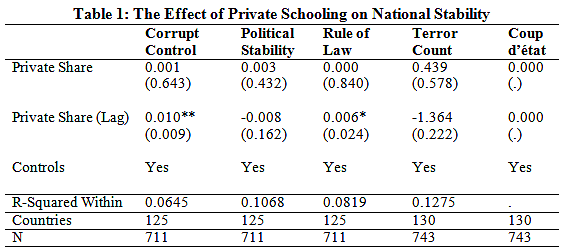School choice critics often resort to fearmongering. For example, a Superintendent of Public Instruction in North Carolina contended that citizens “could be in dangerous territory” with the expansion of private school vouchers. After all, she argued, “there is nothing in the [voucher] legislation that would prevent someone from establishing a school of terror.”
The only problem is that the facts don’t support these scare tactics.
My just-published study examines whether fluctuations in the private share of schooling affect national stability within 177 countries around the globe over 16 years. The analysis does not detect contemporaneous effects of private schooling on any of the five measures national stability. However, I find evidence indicating that increases in private schooling improve measures of perceived control of corruption and rule of law – provided by the World Bank – when students become adults.
As shown in Table 1 below (and in the original study), a one-percentage point increase in the private share of schooling enrollment is associated with around a 0.01-point increase in both the perceived control of corruption and the perceived control of the rule of law even after controlling for changes in factors such as GDP, population, and government expenditures.
Table Notes: p‑values are indicated in parentheses. * p < 0.05, ** p < 0.01, *** p < 0.001. All coefficients are average marginal effects. All models use year and country fixed effects with time-variant controls added and a 7‑year lag of the private share of schooling enrollment. Column 5 does not show any results for Coup d’état because the dependent variable did not vary. When the instrumental variable employed by DeAngelis and Shakeel (2018) and DeAngelis (2017)—short-run fluctuations in the demand for schooling—is used, the lag coefficient for Rule of Law remains statistically significant; however, the lag coefficient for Corrupt Control becomes statistically insignificant with a p‑value of 0.11.
This study doesn’t provide any evidence to suggest that private schooling is dangerous to societies around the world. If anything, it appears that private schooling improves the character and citizenship skills necessary for social order. And this study isn’t alone. None of the eleven rigorous studies on the topic find that private school choice reduces social order in the U.S. The majority of these studies actually find positive effects on civic outcomes. But why?
Private schools must cater to the needs of families if they don’t want to shut down. And, of course, families want their children to become good citizens. But government schools remain open whether they teach kids character skills or not. Perhaps supporters of the status quo should consult the evidence – and basic economic theory – before resorting to scaremongering.

